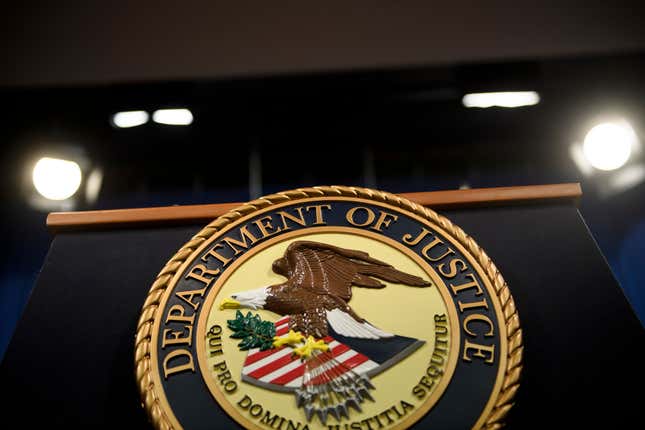
As the coronavirus crisis continues to dominate mainstream media and the general public continues to be in frenzy mode, the Department of Justice has quietly asked something of Congress that would lend feelings of vindication to every amateur conspiracy theorist clogging our newsfeeds with their hot-takes on how the government created the virus in order to justify overreach as they institute “marshall” law. (Apparently, a lot of people either don’t realize the word is “martial” or they believe Eminem is coming to destroy society as we know it.)
According to Politico, the DOJ wants an end-run around habeas corpus, which is the constitutional right to appear before a judge after arrest and seek release. The department is requesting the ability to ask chief judges to detain people indefinitely without trial during emergencies—in this case, the coronavirus pandemic being that emergency. They also ask that the attorney general be granted the power to ask the chief judge of any district court to pause court proceedings “whenever the district court is fully or partially closed by virtue of any natural disaster, civil disobedience, or other emergency situation.” What they call “emergency” refers to “any statutes or rules of procedure otherwise affecting pre-arrest, post-arrest, pre-trial, trial, and post-trial procedures in criminal and juvenile proceedings and all civil process and proceedings,” according to the documents the department sent to Congress.
Norman L. Reimer, the executive director of the National Association of Criminal Defense Lawyers, expressed his concerns to Politico regarding the potential conflict with the people’s constitutional right to due process.
“Not only would it be a violation of that, but it says ‘affecting pre-arrest,’” said Reimer. “So that means you could be arrested and never brought before a judge until they decide that the emergency or the civil disobedience is over. I find it absolutely terrifying. Especially in a time of emergency, we should be very careful about granting new powers to the government.” Reimer continued saying, “That is something that should not happen in a democracy.”
Reimer also criticized another clause in the DOJ proposal asking for the authority to use, in emergency situations only, of course, videoconference hearings, as opposed to in-person hearings, even without defendants’ consent.
“Video teleconferencing may be used to conduct an appearance under this rule,” read a draft of potential new language for Federal Rule of Criminal Procedure 5(f), crossing out the phrase “if the defendant consents.”
“Video teleconferencing may be used to arraign a defendant,” read draft text of rule 10(c), again striking out the phrase “if the defendant consents.”
“If it were with the consent of the accused person it would be fine,” Reimer said. “But if it’s not with the consent of the accused person, it’s a terrible road to go down. We have a right to public trials. People have a right to be present in court.”
The DOJ is asking for these things among other eyebrow-raising changes in policy, such as changes regarding asylum applications for immigrants, an issue only bolstered by the fact that Trump already keeps a hard-on for denying asylum seekers crossing the border as it is.
Documents reviewed by POLITICO detail the department’s requests to lawmakers on a host of topics, including the statute of limitations, asylum and the way court hearings are conducted. POLITICO also reviewed and previously reported on documents seeking the authority to extend deadlines on merger reviews and prosecutions.
The DOJ wants Congress to change the legal language in immigration policy to state explicitly that people with COVID-19 are not eligible to apply for asylum. The department requests the same for those who are“subject to a presidential proclamation suspending and limiting the entry of aliens into the United States.”
“I think it’s a humanitarian tragedy that fails to recognize that vulnerable people from those countries are among the most persecuted and that protecting them is exactly what the refugee convention was designed to do,” said Layli Miller-Muro, CEO of the Tahirih Justice Center, an advocacy group for women and girls fleeing violence.
“I hope we come out of this with a sense of oneness, interconnectedness,” Miller-Munro continued. “Borders can’t protect us. Viruses do not care.”
The DOJ request isn’t likely to make it through a Democratic-controlled House, but that doesn’t mean that the mere request of these types of freedom-eroding policy changes shouldn’t raise concerns. If the new policies did happen to pass, they wouldn’t only apply as long as the coronavirus pandemic remains active, there would be a precedent for these rules to apply in any situation deemed an emergency. And since the people would have no say in what constitutes an “emergency,” we should all be afraid of that.

